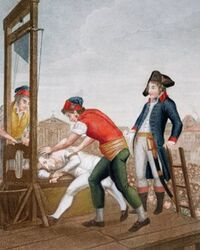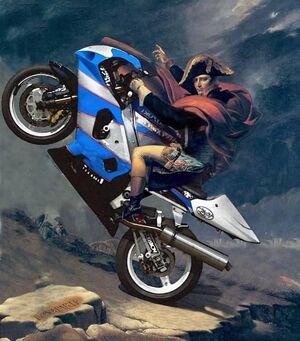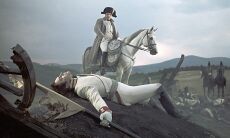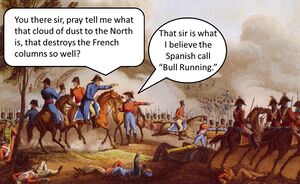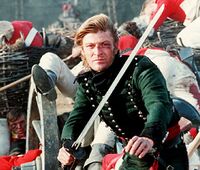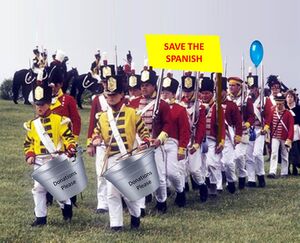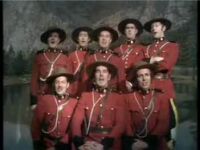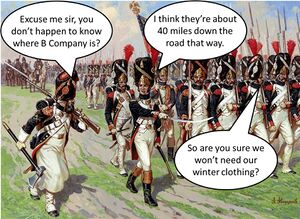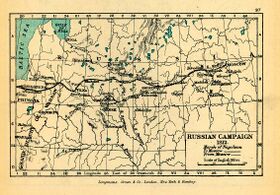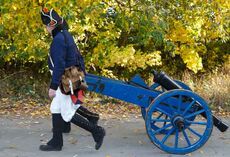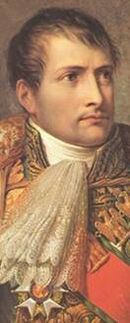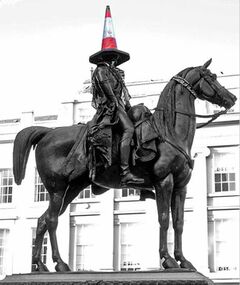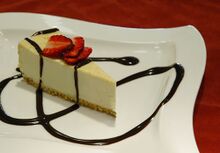Napoleonic Wars
| The Napoleonic Wars | |||||||||||
|---|---|---|---|---|---|---|---|---|---|---|---|
| Part of the ongoing war against the French (oh and of course tyranny, evil etc.) | |||||||||||
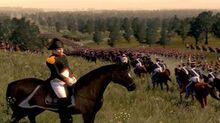 A picture taken of Napoleon while campaigning | |||||||||||
| |||||||||||
| Combatants | |||||||||||
| Commanders | |||||||||||
| Wellington, Kutuzov, Bagration, Barclay de Tolly, Nelson, Hornblower, Moore, Cunningham | Napoleon and his "useless" Marshalls | ||||||||||
The Napoleonic Wars aka Napoleon's Rampage through Europe were a series of conflicts that swirled around a cross Corsican named Napoleon Bonaparte. Napoleon was too short to be a king[1] but barely tall enough for the title of Emperor, a rank sufficient to accomplish the longstanding French dream — creation of a unified Europe[2][3] run not entirely by the Germans. Waging this war let him plant his flag — and seed — in every country he crossed. As a result, everyone in Europe loves France and there are many short people in villages throughout the continent.
During the conflict, the French were supported by many diverse countries, such as Spain, up to the very moment that France invaded them. They were opposed by shifting coalitions of Britain, Austria, Russia, and Prussia. Britain's UKIP maintains the fight against Napoleon even today.[4]
At the beginning, Napoleon extended his empire everywhere on the continent that did not matter to Britain and Russia. This was not successful in making the Russians and British capitulate. He then invaded Russia, which did not work either.
All in all, the Wars resulted in the abolition of the Holy Roman Empire, made up of two opposing sausage-loving pagan cults, which Otto Von Bismarck finally recast as the Uberwurstlande. Other effects were the collapse of the Spanish Empire (which continues to this day) and a huge increase in the world-wide sales of Wellington boots for rubber-wear parties.
French Revolution
Everything started with the French revolution. This event was a turning point in history,[5] as it put an end to the Modern Era and gave a headstart to the Middle Ages, greatly influenced by rampant peasant revolts and bloody executions. But this was not what changed. Before, the ones who were executed were essentially a part of the so-called French noblesse, while 1789 put an end to this aristocratic system and extended this right to the revolting peasants.
In fact, a bit earlier, those peasants made important contributions to the Revolution, by winning it, clearing the way for corruption and terror and kicking back to admire noble French capitalists — whom they still call the the bourgeoisie, to avoid confusion with grubby American capitalists.
In addition, before 1789, everyone had been content with his respective monarch, with the possible exception of the Ewoks in Star Wars Episode VI: The Return of the Jedi or anyone who had lived through the Magna Carta. After the revolution, the ruler was a man issued by the lower society, and, consequentially, with with whom everyone could be uniformly displeased.
This strengthened his inferiority complex, already assured by his physical complexion, and made possible the wars, which otherwise the peaceful Emperor would have never been able to start.
Guillotine
Another prime contributor to this event was a French doctor Joseph-Ignace Guillotin, who invented the guillotine as a labour-saving device. Guillotin, a heart-lung surgeon who originally just wanted easier access to the work site, vastly augmented national productivity, given the increasing popularity of the death penalty. The humble Dr. Guillotin spelled his invention with an "e" on the end to deflect credit for the invention, but France tried to show her appreciation to the Doctor with a first-hand public demonstration of the device's use. However, when he did not appear for his audience with the Emperor due to being "on duty at the local hospital," someone else with the same surname was honored in his place.
The Italian Campaign
In the Italian Campaign, Napoleon's first important task, the future Emperor proved himself by driving starving French peasants hundreds of miles across Italian land to attack the Austrians, breaking all the expensive high-tech equipment that France possessed at the time (pictured). Since that moment, the French have never been very prominent in industry. At first, the French army spent most of its time stripping the local vineyards of grapes for wine, though morale suffered when the army found utterly no cows, sheep, and goats for the obligatory cheese. However, the quick-thinking Napoleon inspired his troops with a speech that claimed that this second vital ingredient lay just beyond, in the "the sheep-grazing hills of Austria and the cow-laden fields of Hungary."
Napoleon succesfully beat back the Austrians and proclaimed a ban on immigrants. This deeply angered the Pope, who called on all Catholic nations to rise up and supress France.[6] Unfortunately, thanks to Martin Luther, there were only two left that could contend with France: Venice and a demoralised Austria.
The Egyptian Campaign
Napoleon began his Egyptian Campaign for easy access to Middle Eastern oil reserves,[7] and indeed, modern accusations that this-or-that policy constitutes a "war for oil" have their basis in that fight. Napoleon assumed that invading Egypt would induce Britain to abandon India. However, Napoleon did not know that India is nearly 4500 km distant, and that his conquest of Egypt would do nothing but establish the fez as a French fashion staple.
This campaign began with the conquest of Malta, one of Napoleon's greatest achievements. In a difficult battle, 40,000 French soldiers defeated 2,000 Maltese Knights (half of whom were French and refused to fight).[8]
After that, the French fleet successfully landed in Alexandria, though it was supposed to land elsewhere. That day Napoleon spoke to his soldiers for the first time. He said:
| “ | The peoples we will be living alongside are Muslims. Do not contradict them; just treat them as you treated the Jews. You will here find different customs to those of Europe. Get accustomed to them, or accustom them to your bayonets! The only people you can afford to treat differently are women - they don't have suffragettes in this country. | ” |
The speech inspired all the soldiers, especially because the only part they listened to was the one about women. Immediately after, they gathered in a large group of people almost as scary as a troop of Cossacks, which since then was referred to as the Grande Armée, and arrived at the walls of Alexandria, famous for its female citizens, travelling to a longer distance and quicker then they ever did. The city resisted to its full capacity, which lasted a better part of a day but finally succumbed.[9] History conceals in secret what happened next.
Other important achievements of Napoleon included the French army conquering an Egyptian village and then losing it. All in all, he spent three years of his life after the French Revolution conquering the country and then giving it back.
Napoleon comes to power
Napoleon proclaimed the Egyptian Campaign a success — discounting the loss of the entire fleet, decimation of the army to the disease they called La Merde de Terre ("The Rather Unpleasant Thing from the Earth"), and his own generals' failed coup d'états. Separately, he proclaimed that he enjoyed unprecedented popularity and it was time to become an official monarch — and the time was when no one was looking.
The leaders of the Revolution took his word that the French people adored him as a hero, and he had a romantic Corsican accent too. Thus, in 1799, they proclaimed him First Consul and later Emperor of France, and left him to his fate.
European Blockade
Napoleon's rampage across Europe was a lull in the storm for Britain, which put the time to good use by having the Royal Navy blockade every French port to embargo her from her colonies. Breakfast victuals were especially hit, but Napoleon, waking up and not smelling the coffee, knew he had been had, and marshalled a huge fleet of French and Spanish ships to sail to the Caribbean for a refill, it being a closer source of java than Java.
Off the coast of Cape Trafalgar, the fleet disappeared into a flock of pigeons. On receiving the news, British admiral Lord Horatio Nelson rushed to the Spanish coast, convinced there would be less competition at the counters for the "bottomless cup." He was surprised to see the ships from the Caribbean mission in port and loaded to the brim with product. Nelson sunk most of the Franco-Spanish fleet where it lay. Unfortunately, none of the coffee was of the Instant variety, and the resulting mix was not savoury, even with double cream and sugar.
Working on a salty caffeine high, a pensive Napoleon was ashamed of how cruel his Empire had been, compared to the wonderful, peace-giving, charitable Britland.[10] This led to him diminishing taxes, increasing the number of happy French people from 0 to 1 and gaining more popularity.
Napoleon takes over most of Europe
Quickly coming to his senses, Napoleon set out with his Grandé Armeé to invade the whole of Europe and achieve his lifelong ambition of creating a European Union (for the benefit of the French and others). [11] First, he created the Confederation of the Rhine among the minor states that bordered France: Belgium, Luxembourg, and Disneyland Paris. He swept across Europe, knocking down all the German States that stood in the French Empire's path. He took over West Germany, Venice, Austria and finally East Germany. Soon, Napoleon's empire covered a huge chunk of what the British refered to as that "worthless piece of land," Continental Europe.
Napoleon himself said that "a union of the Europeans, controlled by me will be highly beneficial to the French people. If others want to be happy, they have to become French."[12]
On the way to this splendid statecraft were great victories such as Austerlitz, Friedland and Iceland for a free frozen chicken. However, Napoleon was disheartened to find that the two greatest potential adversaries, Britain and Russia, didn't give a damn. He began to wish he had invaded Britain when he had the chance rather than going for the rest of Europe. Happily, he could serve as Adolf Hitler's fall guy when Hitler did the same thing centuries later.
Peninsula War
Moore's assualt
While Napoleon attacked all the boring parts of Europe, Britain instead invaded Spain. The Portuguese reported that Spain had nice weather and drunk football fans, leading the Brits to believe they could become rowdy at matches with impunity.
The invasion force comprised tourists led by an inspirational, upper-class, young tourguide named Sir John Moore. Inquiring as to the warmest parts of the Iberian Peninsula, the Portuguese directed Moore toward the centre of the Peninsula. Thus, the invasion force headed for Madrid.
Spain, however, was under French control by this time (King Ferdinand busted down to mixing the barbecue sauce); and Napoleon, about to fire upon Prussia (Germany's earlier attempt to create an "East Germany") heard of the British operation. Concerned that the French tourists in Spain would be elbowed away from the bar by English ones, Napoleon wheeled the elite troops of the Grande Armée away from their eastern front toward the new western front.
Moore saw the army of 200,000 Frenchman approaching his force of 50,000 and decided it would be better to find a place near the coast with plenty of sand to build sand castles. On arrival, however, he found that all the best spots for towels and parasols were already taken by Frenchmen. The result is known as the Battle of Corona. The modern opinion is that Corona is as weak as piss, a mere shadow of what it was when one had to journey to Mexico to try it, but Moore ordered his men to keep "stiff upper lips" and they succeeded in getting so drunk on the stuff that the only strategic option left was to board any available sailing vessel and return home.
Wellesley takes Portugal
After Moore's disastrous assault of Iberia with a force of tourists, the British took a very British option and attacked the French again, with military soldiers. France disdained the British Army (unrepresentative defeats at Agincourt, Poitiers and Crecy notwithstanding). Arthur Wellesley, a British General was sent to re-take Portugal and Spain from the French.
In 1809 the British landed north of Lisbon. The French sent a small force to Oporto to defeat the small English landing force. Unfortunately, Oporto was the home of Port, a beverage the French soon learned to love. The tipsy French soon neglected their opponents entirely.[13]
Wellesley had a dilemma: If he sent the British troops to attack the French, they too would succumb to the regional quaff. However, if he simply beseiged Oporto, his troops would be defeated by much larger French forces who would break the siege. Wellesley's solution was to use German troops from the King's German Legion. They are partial to lager, and even being over-served only served to make them over-precise. The Krauts overcame the French defenders without themselves getting overcome.
The British force advanced through Portugal and then back toward Madrid. Despite defeating many French armies thrown against him on the way, he earned little respect, as he was Irish and not truly British.
Wellesley was renowned as a master of logistics. His army was fully supplied, needing nothing from the land. This was because McDonald's and Pizza Hut had sponsored Wellesley's 500-mile march across Spain. British troops ate nowhere else, many close to collecting 3-of-a-kind of gamepieces with their Happy Meals. In addition, the well-trained British could fire 3 shots a minute, as opposed to the French infantryman's single shot of Port per minute, which left the Frenchmen helpless.
“When other Generals make mistakes, their armies are beaten; when I fall down a hole, my men laugh at me.”
Despite the British victory at Talavera, the now Viscount of Wellington retreated steadily to Lisbon as the Spanish rebels in the area were being crushed and Napoleon's greatest Marshall, Marshall Salt, was advancing towards Lisbon (Oporto had been drunk dry by this point).
(Sponsored) march on Madrid
After wintering behind the Torres Vedras, Wellington finally got around to liberating Spain, a mere 3 years after the British first envisaged it. He was low on ordnance, though, and planned a "sponsored march" on Madrid. It was an idea he took from a charity day at his primary school. As he would later say, "The British education system really does train every man for war."[14]
Wellington therefore decided on a route to Madrid that would pass all the major Spanish cities in the West of Spain to collect as much money as possible. The Spanish, hearing about the project, overthrew the French in their area, who were vehemently against futile charity schemes, and lined the streets with bags of loot to throw into the collection buckets. Soon the British were moving through the Spanish country waving "Save the Spanish" banners and piling up collection buckets.
When Wellington reached Salamanca, he once again encountered Napoleon's most trusted Marshall Salt. This time Marshall Salt felt more confident as he had been reinforced by Polish troops (Polish immigration to Western Europe had just begun around this point). The French and British armies marched around in a circle, eyeing each other up, a tactic present in many shoot-outs of Western Films. The British, however, drew first and sent their British, German and Portuguese troops smashing into the French lines. The French almost immediatly broke. The Poles as usual had stolen most of their jobs; the French, now employed as cooks and quartermasters in the French Army routed them en masse. The Poles gave way after a gallant fight, mainly thanks to new Spanish illegal immigrant deportation laws, while Marshall Salt abandoned his army, pretending that he had never controlled it in the first place. Napoleon didn't buy it and instead renamed April Fool's Day (Fish Day in France) to Salt Day. The pun being that, according to the French, when salt is sprinkled on fish it ruins the taste.
The British finally reached Madrid, swarming through the city to reinstall Ferdinand ('Nando') as the King of Spain. When Madrid fell, the French position in Spain deteriorated thanks to the sudden poor weather, which rusted their wagons and weapons. Wellington continued to push Napoleon's armies into France until 1814, when Napoleon's Empire called a tea break for a year, while Napoleon himself went to relax on the Isle of Elba to clear his mind and Salt his wounds.
Legacy
For most other nations, the War in Spain had been a sideshow; however, for Britain it was the epitome of the whole Napoleonic Wars, along with Waterloo and Trafalgar. A small professional army had kicked the mighty French bottom right out of Spain so that the Spanish could once again continue to exist as a slowly declining country and run into more financial problems and rebellions.
It was history's first case of Russians blaming British for not doing their share and forcing Russia to do it itself, as it took Russia two years to expel Napoleon's Grande Armee of 600,000 men and drive them across Europe from Moscow to Paris, and it took 4 years for the British to rid Spain of Marshall Salt's 200,000 men garrison and travel across the Iberian Peninsula from Lisbon to Madrid. The second example of the Russians blaming the British for not pulling their weight was, of course, World War II because the British and French barely suffered anything when France was invaded and and the Channel Islands wiped out.
The War of 1812
As with most European wars, the Americans felt a necessity to enter the Napoleonic Wars and turn it into a World War. As usual they had planned to enter the war late just as their allies were winning and then claim victory for themselves, so they declared war on Britain in 1812, right after the French looked sure to win the war against Russia. Unfortunately for them, unlike with the First and Second World Wars, the USA hadn't entered on the good-guys' side. This meant that America's invasion of Canada was squashed by Canadian peasant farmers and Native Americans, fighting for freedom and liberty. This confused the American troops because they thought that they were the ones fighting for this.
After the USA's defeat the country fell into complete confusion. It was hard for the people to get over the fact that the US was on the Axis' side and that the President had got it wrong. While the Americans were staggering about in bewilderment, King George III couldn't hold back his childish intrigue on whether fast food (which did not exist in Europe yet) really was as good as they said it was. He therefore sent a group of British troops up the Hudson River to raid the Presidential Palace and report back with the President's food. Unfortunately the situation got out of hand, as the British troops ate the American President's dinner and accidentally left on the oven, which burnt down the Whitehouse.
The Americans finally agreed to sign a peace treaty with the British, after all their ports had been blocked for five days, which made McDonald's take out one of the layers in their "Triple, Double-decker Whooper" and the American people could not stand eating a "Double, Double-Decker Whooper" as a replacement.
Russian campaign
Reasons
After the disappointing results of his European blockade, Napoleon looked for a scapegoat, and found the Russian Empire. Russia never even tried to break diplomatic relations with Great Britain, and in fact Russian peasants were selling fine firearms and horses to British soldiers. These soldiers, being equipped for war, were ill-equipped to surrender to Napoleon's blockade, which kept the peasants devising new things to sell, a prototype of Eisenhower's "military-industrial complex" with trilled r's, a vicious cycle which could only be ended with a war.
But the peaceful Russians would never fire the first shot. That left it to Napoleon. Napoleon, who has never succumbed to any authority, could not understand how a country that had not even experienced a proper revolution could dictate his behaviour. The French agreed that this was a good reason to start a war.
Beginning of the campaign
The great French Emperor began the Russian campaign. Unfortunately for him and for the army, it was the end of June - one of the two and a half months when winter is not in its full possession of the country, though it was of course a lot easier to confuse months back in the nineteenth century, when the world knew neither portable calendars, nor smartphone applications.
Napoleon made the great entry into both Russia and the history books. He crossed the same river Hitler would come to cross a hundred years later, which, oddly enough, isn't an example of the famous biological law, stating that "great minds war alike", as the phenomenon can easily be explained by close friendship between the Emperor and the Führer, allowing them to share their plans.
Napoleon Bonaparte began this glorious campaign by decapitating one of his generals, which scared all the Russians, so that they did not dare deny him an access into their homeland. Instead, the government received a 300-page manuscript that presented more than a thousand arguments, ranging from the microbiological to the geopolitical ones.
Battle of Borodino and its consequences
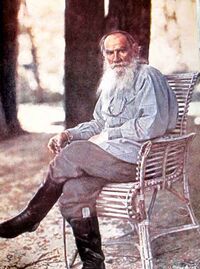
The whole French Grande Armée (600,000 strong) was able to reach the Borodino field full of nothing, where the Russian army had hidden the night before. That had been accomplished so well that Napoleon could not find them until the following morning. Russia attacked, and simultaneously retreated, as one of the more famous Russian reversals says: "The best attack is defence".
The French knew of Russian bravery and strove to outdo it. Their entire army ran right into the Russian canons and bayonets. When this baffled their enemies, the French repeated the manoeuvre several times. Napoleon soon lost most of his talented officers and soldiers, and the battle began. Glorious Kutuzov, who commanded the Russian army, failing to fall asleep surrounded by constantly firing not just the canons but a few rounds and sea shanties, begged his soldiers to take him away from the battlefield. All the Russians, who were still alive, followed.
The historians still argue over the winner of the Borodino Battle.
The end of the campaign
After losing the Borodino Battle, Napoleon decided to enter Moscow, which surprisingly was not defended, because Kutuzov could not sleep there either, the sound of construction of new building always disturbing him.
As Russian hospitality was common knowledge, the French Emperor spent the whole day on of the hills near the town (the building happening quickly, Moscow was already more than a village by the time the invasion happened) waiting for the Russian Emperor to welcome him. After his impatience and fatigue took over the politeness, he entered Moscow without noticing that all its citizens disappeared, chose a modest apartment in the Kremlin museum and fell asleep without even drinking (Russian wine does not count, because of its inferior quality to the French drinks).
The next morning, Napoleon found all of Moscow on fire. He realised that the climate was not as good, as the Russian spies at his service told him it would be, and ended the campaign by repeating the trick he has already performed quite a few times by now: the Emperor came back to France, leaving his army behind.
Situation after the campaign
After the campaign ended, Napoleon's situation was worse than before it started. This cost him quite a capital, something that still happens when one calls a French plumber about a problem in the apartment.
However, when Russians came to France to give Napoleon back what he left in Russia, the hosting country only benefited from the event, as hungry Cossacks boosted the revenue of cafés, restaurants and a new type of establishment - bistros[15], which pretended to serve the customer quicker than before. Nevertheless, even today the Russian Cossacks customers are still not satisfied with the service.
Additionally, the Russian war tactic has revealed itself very wise. France tested it during the Second World War, only they used the force of the Allies to turn the enemy out of the country.
Minor effects of the Russian campaign included liberating several minor European countries from French authority.
The Battle of Nations - Leipzig
Unfortunately for Europe, Napoleon wasn't done yet. He may have been expelled from Russia but he didn't want to relinquish the rest of Europe, a Continent which he loved so much that he taxed his population to bits about it. As with Hitler's final days, Napoleon too believed he could live on. The Sixth Coalition was formed with Sweden, Prussia, Great Britain and Russia against not France but Napoleon himself. This was generally accepted to be the case by all powers involved apart from Britain who insisted they were fighting both the French and Napoleon.
Soon Metternich, the great map-maker and magician of European politics, pulled Austria into the alliance and the armies of Austria, Prussia, Sweden and Russia descended upon the remanants of the French army at Leipzig.
The Battle of Leipzig was fought in 1813 and was fought by 600,000 combatants making it the largest European battle to take place before WW1 and the most disorganised rabble of men ever to travel to one town in Europe until England invented football and played an away game on the continent. The French army and Napoleon was defeated, finally putting an end to his succesfull string of victories he had aquired over his life. This annoyed Napoleon a lot as he had wanted to mention those victories on his CV for when he needed to apply for his next job.
Napoleon rushed back to Paris and formed a defence of the city. Unfortunately the word "defence" in French has two meanings so his "useless Marshalls" mistaked the command and began to defence the city by removing any fences and barricades which blocked the allied path to victory. The allies then swarmed into the city and Napoleon resigned as Emperor with his famous speech in which he kisses the French flag along with his soldiers and manages to cause one of the greatest outbreaks of typhoid in Paris.
Napoleon's Exile on Elba
Napoleon finally decided to abdicate the throne of France after the fall of Paris and was sentenced by the allies to live on the Island of Elba ("Elba" being the Italian word for "Elbow"). It was generally agreed by both British and Russians alike that this was an extremely generous re-habilitation for a lower-middle class pleb who'd only taken over all the boring and useless parts of Europe.
While on Elba, Napoleon's illnesses such as madnees got much worse and he began ruling the island as though it were his own. This did not bother the islanders too much as Napoleon's other illness of Alzheimer's meant that he forgot that he ruled over them most of the time. Napoleon when in a fit condition complained that his British Government paid social healthcare worker only came round to his residence once a week for fifteen minutes which was inadequate care for his mental conditions. He was surprised when he was informed that this was because the social healthcare worker was only paid two tupence a week for her services thanks to large Government funding cuts.
Finally Napoleon got fed up and bored of the Island of Elba. He found the taste of the local cheese and wine taste not up to the standards that any "any decent Frenchman could accept" and he therefore decided to end his exile and return to France to build a socialist country that could actually afford social healthcare workers where Frenchman did not need to work and the Government paid them for just being there and being French everyday.
The Hundred Days Campaign
When Napoleon returned from exile he was re-united with his people who had no choice but to adore him for fear of Napoleon remembering he'd left his guilotine behind on Elba. The old Bourbon Monarch was kicked out and replaced with Custard Cream, which had always been Napoleon's prefered choice of biscuit.
Pre-Waterloo
Napoleon decided to invade Belgium first as they seemed easy prey to him and he craved for the taste of Belgian chocolate in his puddings. This just happened to be the place where the British, Dutch and Prussian armies were lying in wait and so Napoleon had to defeat each in turn because he was only on Level 1 of the campaign so the AI Prussian army was on super-easy mode. After sweeping aside Prussia easily, Napoleon turned to face the British at Waterloo, named so because the sewage system often was used to cultivate the local agriculture.
The Battle of Waterloo
“By God sir, I've lost my mind!”
“By God sir, so you have!”
On 18th June 1815 Napoleon and Wellington faced each other over the boggy ground outside Waterloo. Wellington had chosen his position carefully on a steep ridge so that his troops could peer down upon the beautiful French women in the French camp so that they were inspired to win the battle and also so that the French would be forced to advance into the local sewage draining system outlet (although it turned out that the French found this more satisfying than disgusting).
Napoleon, not having had his breakfast that day, sent in an attack against the French Chateau on Wellington's right-flank in an attempt to steal the wine and cheese from the storeroom to feed Napoleon and his Marshalls. This attack was repulsed by the British Foot Guards, the elite troops of the British Army, who then ceremonaly burnt the alcohol storeroom down in plain sight of the French. Horrified that the British had little respect for proper cuisine, Napoleon went on a full scale attack with the main body of his men. Seeing the French attack most of the Dutch remembered they'd left their orange flags behind in Holland and so ran away back home to retrieve them. This left a small Scottish force protecting Wellington's centre. General Picton in command of the Scots cried a celtic war chant and then they all charged down the ridge into the oncoming French. The French immediatly routed, smelling the putrud smell of the average Scotsman. The British cavalry were also commited to battle at this time too, by Lord Uxbridge. They charged straight into the French guns and their horses were made into meals for the starving French peasant soldiers.
Napoleon himself retired, still in shock at seeing good French wine lain to waste and Marshall Ney took command of the field. Marshall Ney remembering the French use of tactics at Agincourt, sent in the whole French cavalry against the British. The British and remaining Germans and Dutch formed squares with bayonets acting as steaks around the edges of these squares. Wellington then ordered the men in the middle of the squares to fill up buckets with the local sewage drained onto the land and chuck the buckets at passing French horsemen. The French mistaking the sewage as perfume, presumed the British wanted to be friends and trotted back to the French lines. Napoleon, who had returned from his 4 hour long toilet break, was furious with the situation. "Attacking the British infantry is like trying to attack a brick wall, that throws poo back at you," Napoleon is quoted to have said. At that moment the trade union leaders of the French army declared that their daily strike was overdue and so they sent the French Army home. Napoleon fled the field for Paris.
The French view of Napoleon's defeat
French generals, who have survived after the battle, asked General Antoine-Henri to speak for them in front of the people, whilst they were booking a hotel in Corsica. This is what he said:
| “ | In my humble opinion, four principal causes led to this désastre (not counting an abondance of many minor ones; back then we were the most infortunés men the the world has ever seen): The first, and the most influential, was the ennemi and his forces. The second was the admirable structure of the British infantry (as well as that of all their allies), joined to the sang-froid (pure French sang-froid) and the aplomb of its chefs. The third was the weather horrible that les British brought with them. It softened the ground wherever our soldats went, rendered our mouvements offensives impossible and retarda till one o'clock the attacks that were planned for the previous weeks. The fourth was the inconceivable formation of the first, the last and the middle corps of the armée, organised by incapable Napoléon's maréchals.
All these combined, our defeat was completely assured and foreseeable, so that I would have bet on it if I had an opportunité. Au fait, I did have an opportunité and so I bet on it. My entire capital, including my house and wife. My opponent did the same. The next day I did everything I could to increase the chances of my win. Finally, when I was entirely sure about it, I started crushing the ennemi as if I was a lion, a lion français, of course! Life comes before work, as Napoléon used to say to his friends (usually while savouring a bottle of excellent French wine). Oh, what a day glorieux! |
” |
Napoleon's Second Exile
Realising that all was lost, Napoleon prepared his suicide pill. However this was mistaken for a mussel and served up to an unsuspecting customer in a French seafood restaurant in Brest. Napoleon attempted to flee to America but made the mistake of trying to go to North America and not South America, South America being where most dictators fled to and North America being firmly under the control of other dictators. He was caught by the British and taken to St. Helena, an island in the middle of the Atlantic Ocean. There he spent the last few years of his life, playing the sixth Dwarf at the local pantomime in annual theatre performances.
Napoleon's legacy
Napoleon's main plans and ideas were reconsidered by all the following French monarchs and were realised peacefully (with more discontent people, but less military coups) after all the French military campaigns failed. The result was the League of Nations which later turned into the European Union. This system heralded the "Code Napoleon" - one of the most famous constitutions of history, built on the system of Democratic Oligarchy.
Napoleon was posthumously adored in France and has since then been seen as a French hero and also the only person in history to ever amasse a group of over 10,000 Frenchman who were not on strike. Unlike the Germans, the French are allowed to admit that they are proud of their dictator because he treated all the nations and races he conquered with equally.
Napoleon's name lives on in many cuisine delicacies of France, including "Le Gâteau de Napoléon"; "Napoléon Délicat au Chocolat" (Delicate and Chocolate Napoleon) and "Les Cuisses à la Grenouille" (a reference to the fact that Napoleon always had to jump to make up for his height). Surprisingly his name also lives on in the English Language with "Boney" meaning a decrebid, nutcase who has lost his marbles.
Some Frenchmen simply choose to believe that the Napoleonic Wars have never taken place and were in reality dreamt up by Russians and Brits alike in pubs and taverns, who added a combined hate for the French to a description of a malicious brawl taking place in one corner of the inn. These Frenchmen pretend that nothing happened between 1789 and 1815 and will suddenly shiver and change the subject in a conversation if those dates are mentioned.
See also
Historical figures
Historical events
In popular culture
Reference List
| Featured version: 6 July 2014 | |
| This article has been featured on the main page. — You can vote for or nominate your favourite articles at Uncyclopedia:VFH. | |
- ↑ Adrianne Turne (1987) Hitler's Only Got One Ball and Other Anatomical Observations on Various Dictators
- ↑ Andrew Charles (1834) Causes of the Napoleonic Wars
- ↑ Penguin's (2003) The Handy Book for Cross References
- ↑ Nigel Farage (2010) A History of UKIP with all the Bad Bits left out
- ↑ François Le Duc (1964) Les Partes Importantes de l'Histoire
- ↑ Armus Dredus (1858) The Catholic Church Strikes Back
- ↑ Peter Trancer (1902), Oil and How Napoleon Got Covered in It.
- ↑ John Invern (1947), Why the Maltese Don't Deserve the George Cross.
- ↑ John Invern (1948), Why the British Should Continue to Rule Egypt.
- ↑ Harry Gareths (1994), Facts about the British Empire that You Cannot Deny
- ↑ François Le Duc (1967) Napoléon était un pacifiste
- ↑ Napoléon (1799) Why Everyone Should Be French
- ↑ Jeff Barks (1975) An Investigation into the Abuse of Alcohol in Western Europe and How to Prevent Alcohol Suffering
- ↑ Brian Derchard (1843) Wellington's Memoirs
- ↑ Originated from the Russian word for "quickly", pronounced (with an enormous accent) by the French as bistro
